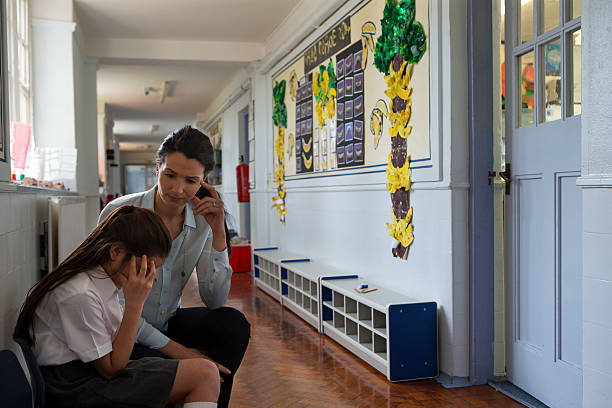Poor grades, anti-social behavior, not finishing homework on time, or not wanting to go to school, do these problems sound similar to you? Do you face this problem daily? How do you know if your child is struggling in school?
If so, it is evident that your child is struggling in school. But how can you help your child when they are not openly discussing their issues with you?
This is a challenging situation that most parents face today. Unfortunately, not only with teenagers but among preschoolers and elementary school goers, struggles are common.
Therefore, we have created this article to help parents who are battling to help their children but have no idea where to start. By the end of this article, you will get some perspective on how to help your child struggling in school.
Signs That Your Child is Struggling in School

Before moving ahead, let’s understand whether your child is struggling in school or just another phase. Here are some common signs to identify whether your child needs your help:
1. They Don’t Want to Talk About School
When your child suddenly refuses to talk about their day and what they did today, this is the first sign that they are somehow struggling in school. Especially if your child is usually chatty and verbal about things.
In this situation, you should try to first talk to your child. But if they don’t open up, you can get more involved in their school activities to find the root cause of the problem.
2. Attitude Shift
If your child used to be enthusiastic and energetic about going to school every day, they don’t want to go to school lately. Then, this is a warning sign. It shows that your child might have problems with studies, having a relationship problem, or some other school-related issue. So, it would help if you try to communicate with your child and understand what’s bothering them.
3. Physical Symptoms
Is your child not eating or sleeping well? Do they experience sudden pain in the stomach or head just before school? Then, sleeping and eating problems are related to stress. So, if your child is under pressure, they might not eat or sleep properly. And sudden pain is a simple attempt to avoid going to school.
4. Spends Excessive Time on Homework
If your child takes more time to complete homework than usual, this shows that your child lacks concentration. In addition, if your child’s homework speed is slower than other children in their class, it is concerning. There might be a possibility that your child has some neurological issues that reduce their learning capacity. If this situation lasts long, it is advisable to consult a professional.
5. Poor Report from Teachers
It is easy to miss behavior and attitude changes among your children. But, receiving a poor report from your child’s class teacher indicates your child is struggling. You should not ignore when your child’s grades drop, or they start to pick fights with other students. Instead, you should sit with the teacher and discuss why your child struggles in class.
How Can Parents Help Children Struggling in Class?

So, you have seen signs of struggle in your child’s behavior. Let’s understand how you can help your child with their issues.
1. Talk to Your Child
The best solution is to talk to your child. First, you should sit with your child and ask what is bothering them.
However, you must use sneaky parent tricks if your child doesn’t answer or tries to dodge the question. For example, you can cook your child’s favorite dish or buy them toys, and once they are in a good mood, you can ask them again.
Related Reading: How to Build a Positive Teacher-Student Relationship: Ways
2. Talk to School
If your children don’t get a satisfactory answer, you can directly contact their school. In addition, you can reach out to their class teacher or even the principal in case of urgency. You can ask the teacher whether they have seen any behavioral change or other issues in your child.
You can also contact your kids’ friends and parents to know what’s bothering your child in desperate times.
3. Get a Help
There is no shame in taking help from someone when it’s a question of your child’s welfare. For example, if your child struggles to read words or make sentences, you can consult a psychologist to ensure your child’s brain is developing perfectly.
If your child’s brain development is perfect but processes information slower, you can hire a tutor to help them with their homework.
In addition, you can use mobile applications, games, and other interactive learning methods to stimulate and improve your child’s performance. Shifting learning methods can dramatically impact a child’s performance in most cases.
4. Put Your Child in Charge
When parents find children in rebel mode, they instantly start imposing more rules on them. This isn’t the right approach. When your child is already struggling, and you start putting more load on their plate, it will only annoy them. So, the best approach here is to let your child decide.
For example, if your child’s grades are gradually dropping, you can ask them to help you find solutions to improve their grades. You should let your child decide whether they want a tutor or an online education app to help them.
What Should Children Do When They Are Struggling in School?

Children should also take some responsibility when they are struggling in school. Children need to reach out to their parents, teachers, or friends when struggling with something in school.
For example, if a child finds it hard to solve math equations and learn science concepts, they should talk about their issues with their parents. They should not hesitate to discuss their problems freely.
This way, children can find the right solution to their problems and quickly overcome their stress. So, if you are struggling in your school, talk about it.
It’s Alright to Struggle in School!

This goes for both parents and children. It is alright if you are struggling in school. It is nothing common and happens to almost everyone.
So, don’t stress or stop talking when your kids struggle to learn a subject or make friends. Just speak with them and let them share their problems with others, even you. Talking always helps to find the right solutions and reduce stress.
Frequently Asked Questions
What should I do when my child is failing at school?
When your child is failing at school, stay calm and don’t scold your child. Instead, discuss with your child the reason behind their poor performance. If they refuse to cooperate, involve their teachers, principals, or friends. You should conduct an open dialogue with your child to help them.
Should I consult a professional to help my struggling child?
If your child struggles to read, write, or make friends in school consistently, this might be a serious issue. So, there is no harm in consulting professionals when your child is struggling a lot in school.

























